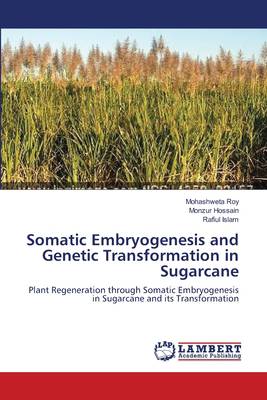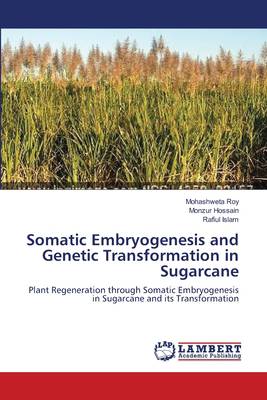
- Afhalen na 1 uur in een winkel met voorraad
- Gratis thuislevering in België vanaf € 30
- Ruim aanbod met 7 miljoen producten
- Afhalen na 1 uur in een winkel met voorraad
- Gratis thuislevering in België vanaf € 30
- Ruim aanbod met 7 miljoen producten
Zoeken
Somatic Embryogenesis and Genetic Transformation in Sugarcane
Plant Regeneration through Somatic Embryogenesis in Sugarcane and its Transformation
Mohashweta Roy, Monzur Hossain, Rafiul Islam
Paperback | Engels
€ 67,45
+ 134 punten
Omschrijving
An efficient protocol for somatic embryogenesis and subsequent plant regeneration was developed for sugarcane variety Isd-16 using leaf sheath explants of 3, 6 and 12-months-old field grown plants. Explants from 6-month-old plant showed the best response and produced highest percentage of calli on MS + 3.0 mg/l 2,4-D. L-proline 25mg/l significantly enhanced somatic embryogenesis. The embryos germinated well on half-strength MS and developed into plantlets. Somatic embryo derived plants under field condition showed considerable variation in morphological, agronomical and biochemical characters. For genetic transformation the calli were co-cultivated with A. tumefaciens strain LBA4404 harboring a binary plasmid pCAMBIA1303 containing hpt (hygromycin phosphotransferase) gene as a selectable marker and a β-glucuronidase (gus) reporter gene in the T-DNA region. The transient expression of gus in hygromycin resistant calli and regenerated plants was confirmed by GUS flurometric assay. PCR analysis of genomic DNA from regenerated plants revealed that the hpt gene was integrated in the transgenic plants.
Specificaties
Betrokkenen
- Auteur(s):
- Uitgeverij:
Inhoud
- Aantal bladzijden:
- 164
- Taal:
- Engels
Eigenschappen
- Productcode (EAN):
- 9783659153884
- Verschijningsdatum:
- 16/06/2012
- Uitvoering:
- Paperback
- Formaat:
- Trade paperback (VS)
- Afmetingen:
- 152 mm x 229 mm
- Gewicht:
- 249 g

Alleen bij Standaard Boekhandel
+ 134 punten op je klantenkaart van Standaard Boekhandel
Beoordelingen
We publiceren alleen reviews die voldoen aan de voorwaarden voor reviews. Bekijk onze voorwaarden voor reviews.











